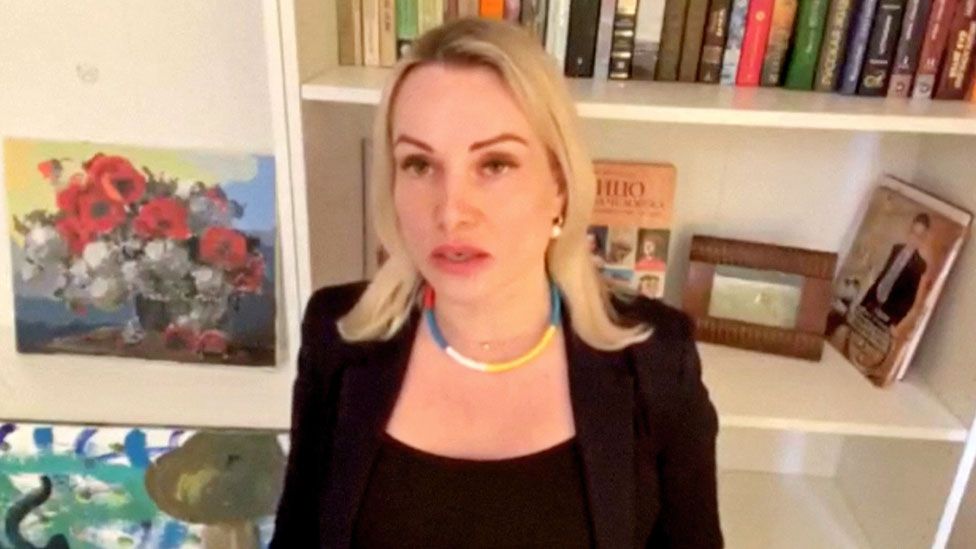
This article is more than
3 year old
Marina Ovsyannikova, an editor at state-controlled Channel 1, was detained after she ran on to the set on Monday holding an anti-war sign.
She was earlier reported missing by lawyers who said they had been searching for her all night.
She has been charged with organising an unauthorised public event.
The administrative charge could be punished with a fine, community service or up to 10 days in jail.
An image circulated widely on Russian media appeared to show Ms Ovsyannikova in court with lawyer Anton Gashinsky.
There were fears she would be prosecuted under a more serious, new criminal law that bans calling Russia's military action in Ukraine an "invasion" or spreading "fake news" about the conflict.
Images of Ms Ovsyannikova's protest were quickly shared across the world after she ran on to the set of one of Russia's most-watched news programmes, Vremya, holding a sign reading "No war, stop the war, don't believe the propaganda, they are lying to you here."
She could also be heard repeating the words "no war, stop the war".
The placard was clearly visible for a few seconds before the programme cut away from the live broadcast to a pre-recorded report.
Before the incident she recorded a video in which she called events in Ukraine a "crime" and said she was ashamed to work for what she called Kremlin propaganda.
"I'm ashamed that I allowed myself to tell lies from the television screen. Ashamed that I allowed Russians to be turned into zombies," she explained. "We just silently watched this inhumane regime."

Ms Ovsyannikova, who said her father was Ukrainian, called on the Russian people to protest against the war, saying that only they could "stop the madness".
"Don't be afraid of anything, they can't imprison all of us," she said.
Ms Ovsyannikova's colleagues at Channel 1 were reportedly surprised by her actions.
One told the Faridaily blog - run by former BBC Russian Service journalist Farida Rustamova - that Ms Ovsyannikova, who has two children, had never discussed politics, but spoke "mostly about children, dogs and the house".
From the moment her identity became known, Ms Ovsyannikova received dozens of comments on her Facebook page in Ukrainian, Russian and English, thanking her for her actions.
Ukraine's President Zelensky also praised her for "telling the truth".
French President Emmanuel Macron said France would launch an effort to offer her protection, either at the embassy or through asylum, and said he would discuss it in his next conversation with President Putin.
But Kremlin spokesman Dmitry Peskov called her actions an act of "hooliganism".
Russian television news has long been controlled by the Kremlin and independent viewpoints are rare on all the major channels.
State-controlled Russian media refer to the war as a "special military operation" and paint Ukraine as the aggressor, describing Ukraine's elected government as neo-Nazis.